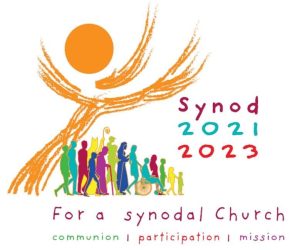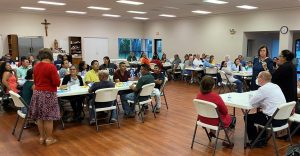By Karen Barry Schwarz, Special to the Florida Catholic
The faithful talked; the Diocese of Venice listened. From January to May of 2022, the Diocese of Venice hosted 12 Listening Sessions, including 11 live sessions at various Parishes throughout the Diocese and one virtual session. The events, most of which were attended by Bishop Frank J. Dewane, were fruitful, and inspiring.
 These sessions were part of the Diocesan Phase of the XVI Ordinary General Assembly of Bishops, “For a Synodal Church: Communion, Participation, and Mission,” as requested by His Holiness Pope Francis.
These sessions were part of the Diocesan Phase of the XVI Ordinary General Assembly of Bishops, “For a Synodal Church: Communion, Participation, and Mission,” as requested by His Holiness Pope Francis.
The passion expressed during the Listening Sessions for the Catholic Faith was ubiquitous, as was the enthusiasm for the synodal process.
Some were surprised that the Church was asking for their input, as this has not been the case historically. Some were even, at first, reluctant to share, feeling it was not their place to do so. But Pope Francis has called on the faithful to come forward, explaining synodality as “a way of being the Church today according to the will of God, in a dynamic of discerning and listening together to the voice of the Holy Spirit.”
“The Diocese found the participating faithful to be inspired and thoughtful in their responses to questions posed during the Listening Sessions, and in the open forum discussions when time allowed,” said Bishop Dewane. “Many also participated via the Diocese’s dedicated synod email address, sending in their thoughts. All comments were heard and appreciated.”
 Overall, more than 1,000 of the faithful participated in the synodal process, including both young and old, women and men, English and Spanish-speaking. Findings were compiled in a detailed report shared with the United States Conference of Catholic Bishops in June. Similar sessions to those held in the Diocese of Venice were held around the country and around the globe; a synthesis of all Diocesan reports will be shared with the Vatican.
Overall, more than 1,000 of the faithful participated in the synodal process, including both young and old, women and men, English and Spanish-speaking. Findings were compiled in a detailed report shared with the United States Conference of Catholic Bishops in June. Similar sessions to those held in the Diocese of Venice were held around the country and around the globe; a synthesis of all Diocesan reports will be shared with the Vatican.
The Diocesan Synthesis Synod Report (a brief version of the full report) and the U.S. National Synthesis Synod Report were both made available in September 2022 and are available for review on the Diocese website at https://dioceseofvenice.org/offices/offices-departments/evangelization/diocesan-phase-of-the-synod-on-synodality/.
Diocesan Synod Synthesis
Within the Diocese of Venice, several themes emerged during the synodal process.
Participants were happy to report that they are proud to be Catholic and are eager to evangelize, but many felt they lacked the tools to do so. There was a general hunger for more catechesis and formation among all. Great interest was expressed in more detailed “refresher course” type information surrounding the celebration of the Mass, and many expressed great interest in the celebration of the Latin Mass, especially as it relates to reverence. Some saw the traditional Latin Mass as a “way back to reverence,” which many saw as missing from the Church today.
Concern was also shared regarding the centrality of and belief in the Holy Eucharist, and it was expressed that this tenet of the Church needs to be reinvigorated. Many also expressed the need for powerful homilies during Mass, explaining that a good homily can provide inspiration for the week ahead. Some put forth the idea that priests ought to marry, as this may spark more interest in the vocation among young men. Others expressed a concern that this would present a dilemma for priests, as they are already married to the Church. Some suggested that women play more of a role in the Mass, and the Church in general, raising the question of women as deacons, or even priests. Many pointed out that women already play a large role in the Church, leading many ministries.
There was concern expressed about several groups who likely feel marginalized by the Church, including women. Other groups identified as possibly being marginalized by the Church included those who identify as LGBT, those who are divorced, those who work full-time, and those who are not necessarily part of any well-established “group” or “clique” in their local parish. It was suggested, for example, that the process for welcoming divorced Catholics back to the Church be made clearer, and that there be more convenient daily Mass times for working people.
Although some felt those living in poverty were marginalized by the Church, the majority felt that the Catholic Church does a good job helping the poor, mentioning Catholic Charities and the fact that the Catholic Church is the largest private social service organization in the country.
The need to reach and engage young people was identified, with many feeling that young people drift away from the Church sometime between the Sacrament of Confirmation and the Sacrament of Marriage. Many felt that young people do not come back until it is time to baptize their own children, and then it may be too late to get them back.
There was a repeated call for continued and increased transparency in the Church, especially as it relates to sexual abuse and the wounds of the past.
Of interest, the U.S. Synthesis also had many of the same findings the Diocese found in its sessions/feedback and many of the same things emerged worldwide.
The Vatican recently published a document that highlights the results of the Synod worldwide and will guide the next stage of discussions in the Synod on Synodality.
The working document, titled “Enlarge the space of your tent,” covers issues across a broad spectrum, from the clergy sexual abuse crisis to Christian unity. The text calls for “a Church capable of radical inclusion” and says that many Synod reports from around the world raised questions about the inclusion and role of women, young people, the poor, people identifying as LGBTQ, and the divorced and remarried.
The 44-page working document is officially called the DCS (Document for the Continental Stage). It summarizes the reports shared with the Vatican by bishops’ conferences, religious congregations, departments of the Roman Curia, lay movements, and other groups and individuals.
Published on Oct. 27, the document aims to be “the privileged instrument through which the dialogue of the local Churches among themselves and with the universal Church can take place during the Continental Stage.”
Catholic News Service provided information for this report.





